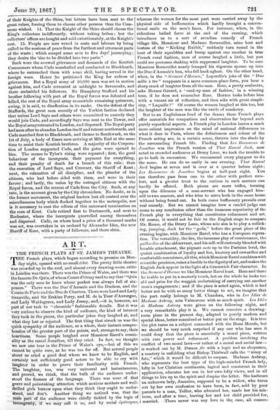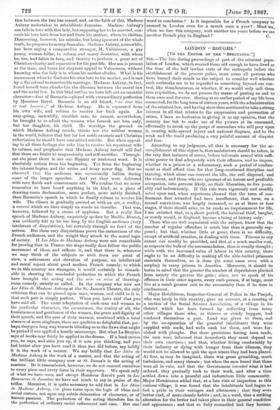ART.
• THE FRENCH PLAYS AT ST. JAMES'S THEATRE.
THE Freiich plays, which began according to promise on Mon- day night, opened with no small e'clat. The pretty little theatre was crowded up to the roof, and almost every drawiug-room critic in London was there. There was the Prince of Wales, and there was the famous Dr. Quin, of whom Count d'Orsay used to say that" Quin was the only man be knew whose pocket was always full of six- pences." There was the Dud' d'Aumale and the Duchess, and the • Comte de Paris and-the Due de Chartres. There were Lord and Lady Granville, and Sir Erskine Perry, and M. de la Tour d'Auvergne, and Lady Waldegrave, and Lady Jersey, and—it is, however, no part of our task to "chronicle" fashionable details. But it was very curious to obserire the kind of ' audience, the kind of interest they took in the pieces, the particular jokes they laughed at, and what they lost or rejected. The first thing that struck us was the quick sympathy of the audience, as a whole, their instant compre- hension of the greater part of the points, and, strange to say, their heartiness. SOMe people laughed over Afonsieur Ravel's comic- ality as the rascal 'Jonathas, till they cried. In fact, we thought we saw one tear in the Prince of Wales's eye,—but of this we cannot be quite sure, as he was too far off. But several people about us cried a good deal whom we knew to be English, and certainly not sufficiently good actors to be able to cry with laughter in order to prove their familiarity with French. The laughter, too, was very universal and instantaneous, and proved, we think, that the bulk of the audience under- stood the finessetr of the language. There was none of that grave and painstaking attention which anxious mothers and well- drilled girls bestow upon what they think they ought to under- stand, and don't. Another thing we noticed was, that the male part of the audience were chiefly tickled by the logic of —incongruity, if we may call it so, and by social iquivogues, whereas the women for the most part were carried away by the physical side of buffooneries which hardly brought a conven- tional smile on the men's faces. For instance, when, in the ridiculous ballad farce at the end of the evening, which introduces us to a sort of arcadian comedy of French village life, Monsieur and Madame Bernouillet, mine host and hostess of the "Kicking Rabbit," suddenly turn round in the heat of their squabbles and bump against one another in true French rural fashion, men of course laughed a little, but you could see peeresses shaking with suppressed laughter. To be sure Monsieur Bernouillet nearly bumped his vigorous spouse up into the Duo d'Aumale's box, who fell back aghast. On the other hand, when, in the •"Serntent d'Horace," Leporello's joke of the "Due mille 6 tre " reappears in a more common-place form, you hear a sharp crack of laughter from all the men. Rose, a pretty soubrette, asks Horace Gerard, a 'used-up man of fashion,' in a winning tone, if he does not remember Rose. Horace looks before him with a vacant air of reflection, and then asks with great simpli- city, " Laquelle ?" Of course the women laughed at this too, but the laughter of the men was like the rattle of musketry. tion between the two has ceased, and, on the faith of this, Madame Aubrey undertakes to rehabilitate Jeannine. Madame Aubray's son falls in love with this lady, but supposing her to be married, con- ceals his love both from her and from his mother, whom he idolizes. Discovering, however, his mistake, but being ignorant of the whole truth, he proposes to marryJeannine. Madame Aubrey, meanwhile, has been urging a comparative stranger, M. Valmoreau, a gay young woman-killer, to reform and marry Jeannine, with whom he, too, had fallen in love, and thereby to perform a great act of Christian charity and reparation for his past life. Her son is present at the time, and hears her eloquent appeal to Valmoreau, without knowing who the lady is to whom his mother alludes. What is his amazement when he discloses his own love to his mother, and is met by a flat refusal to sanction his marriage. Madame Aubrey, in fact, found herself here clinched in the dilemma between the moral law and the social law. In this brief outline we have left out an essential character—that of Barantin—played with extraordinary perfection by Monsieur Ravel. Barantin is an old friend, "en tout Nen et tout honnettr," of Madame Aubrey. He is separated from his own wife, and refuses to receive her back again. An easy-going, unworldly, unselfish man, he cannot, nevertheless, be brought to re-admit the woman who forsook not him only, but her daughter, his child. He worships the ground on which Madame Aubrey treads, thinks her the noblest woman in the world, believes that but for her noble example and Christian exhortation he should have committed suicide. But when appeal- ing to all these feelings she asks him to receive his repentant wife he refuses, and prophesies that Madame Aubray herself will find that there are limits to magnanimity and self-sacrifice. Through- out the piece there is not one flippant or irrelevant word. It is absolutely serious from the beginning. Yet from the beginning the interest begins, and the satire and irony never flag. But we observed that the audience was occasionally listless during some of the longer speeches. And yet they were delivered with rare finish and consummate art. We confess that we never remember to have heard anything in its kind, as a piece of drawing-room declamation, more perfect, more subtly finished, than Barantin's speech in which he finally refuses to receive his wife. The climax is gradually arrived at with an art, a reality, a naturel which we have simply no words to describe. That was, however, followed by a storm of applause. But a really fine speech of Madame Aubrey, exquisitely spoken by Madlle. Brunet, was evidently felt to be too long by the English audience (very intolerant of disquisition), but certainly through no fault of the actress. But these very disquisitions prove the earnestness of the French audiences, and the weight they attach to the moral logic of society. If Les Idles de Madame Aubray were not remarkable for proving that in France the stage really does follow the public movement of ideas, and reflects it, and that there is, whatever we may think of the subjects as such from our point of view, a seriousness and elevation of purpose, an intellectual and moral aspect about good modern French comedy, to which we in this country are strangers, it would certainly be remark- able in showing the wonderful perfection to which the French have brought the acting and the mise en scene of drawing- room comedy, strictly so called. In the company who now act Les Idles de Madame Aubray at the St. James's Theatre, the only criticism that can be passed upon man, woman, and child in it is, that each part is simply perfect. When you have said that you have said all. The exact adaptation of each man and woman to the particular character, the earnestness, the reality of all, the feminineness and gentleness of the women, the grace and dignity of their speech, and the ease of their manner, combined with a total absence of mere staginess, these are qualities so delightful that, per- haps, theygo a long way towards blinding us to the flaws that might be picked if one applied a hostile microscope. But what La Bruyere says of books may fairly be applied to the drama. If a book moves you, he says, and stirs you up, if it sets you thinking, and you feel better after you have read it than you did before, say boldly it is the work of a master. We say boldly that Les Idles de Madame Aubray is the work of a master, and that the acting of the brilliant little company now at St. James's is the acting of masters. Be it remembered, however, we do not commit ourselves to every piece and every farce in their repertory. We speak only of what we have seen, and except Monsieur Ravel's part in Les Ressources de Tonathas we have not much to say in praise of the trifles. Moreover, it is quite necessary to add that in Les Idles de Madame Aubray, the piece turns upon the logic of ideas and social custom, not upon any subtle delineation of character, or of human passions. The perfection of the acting therefore lies in the perfection of ordinary social refinement and ease. But one word in conclusion ? Is it impossible for a French company to succeed in London even for a month once a year? Must we, when we lose this company, wait another ten years before we see
another French play in England ? C.































 Previous page
Previous page